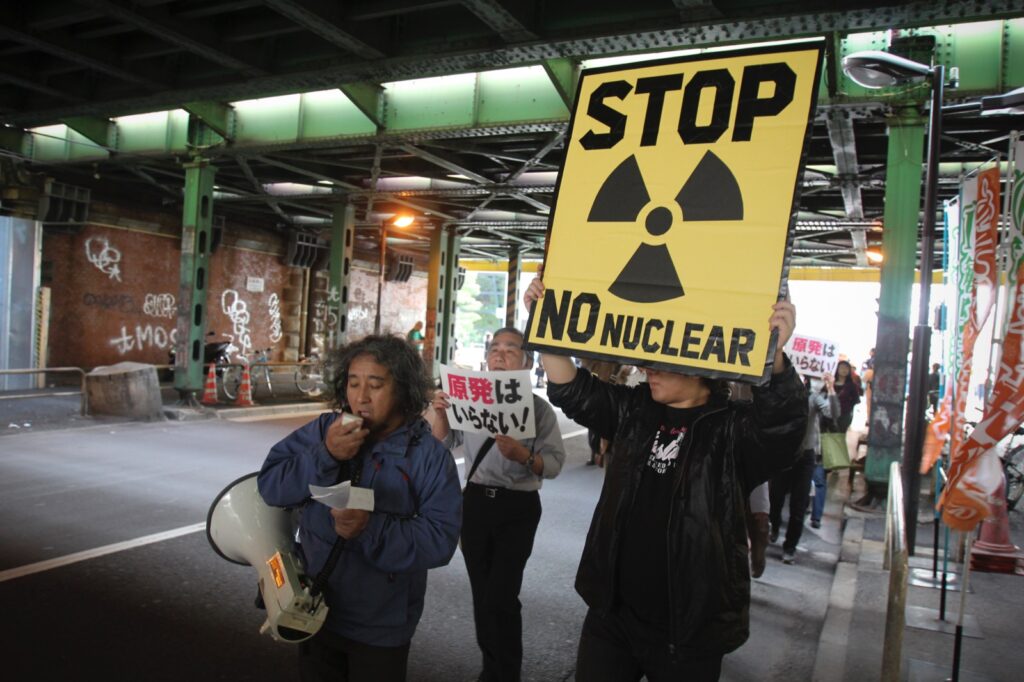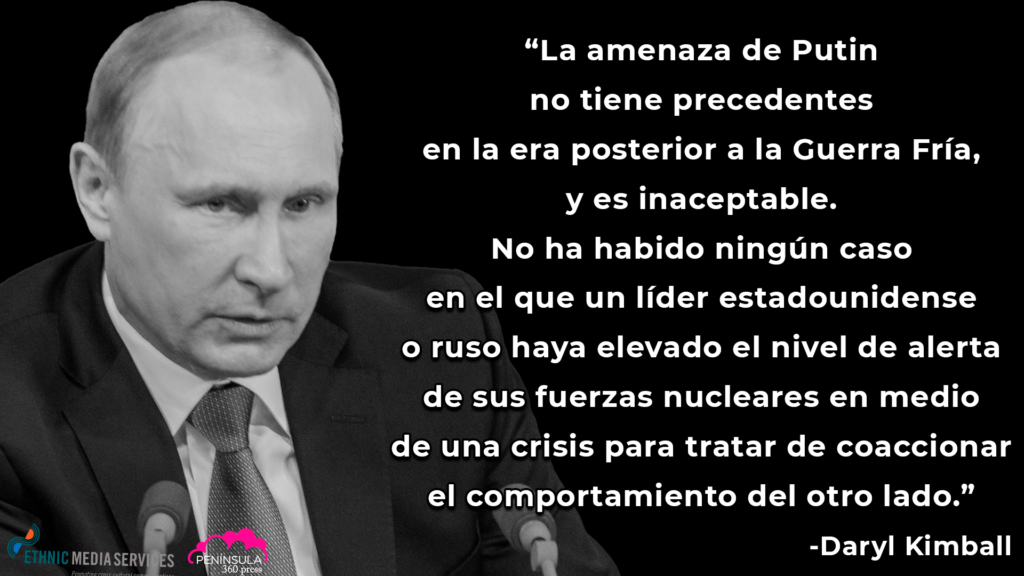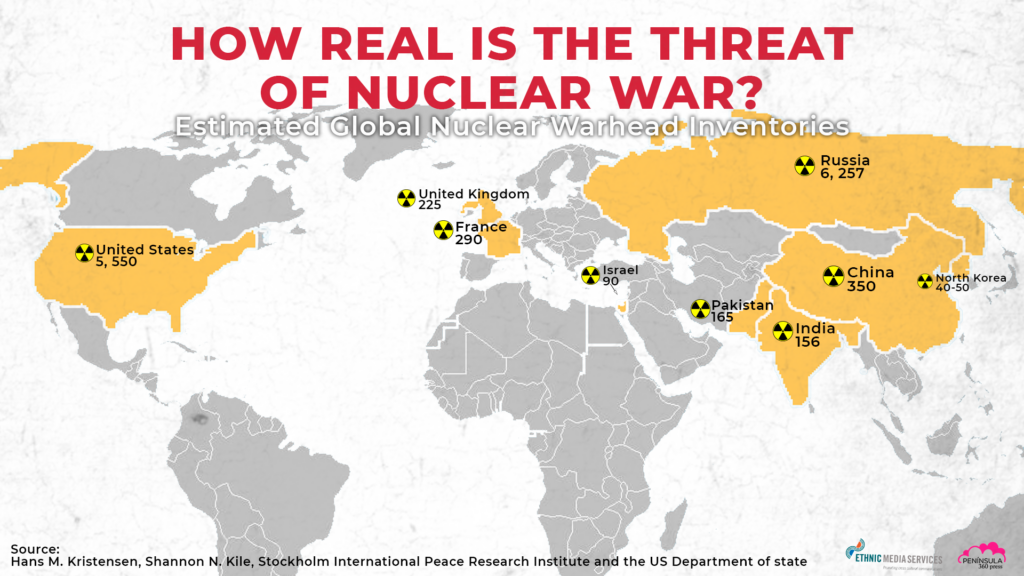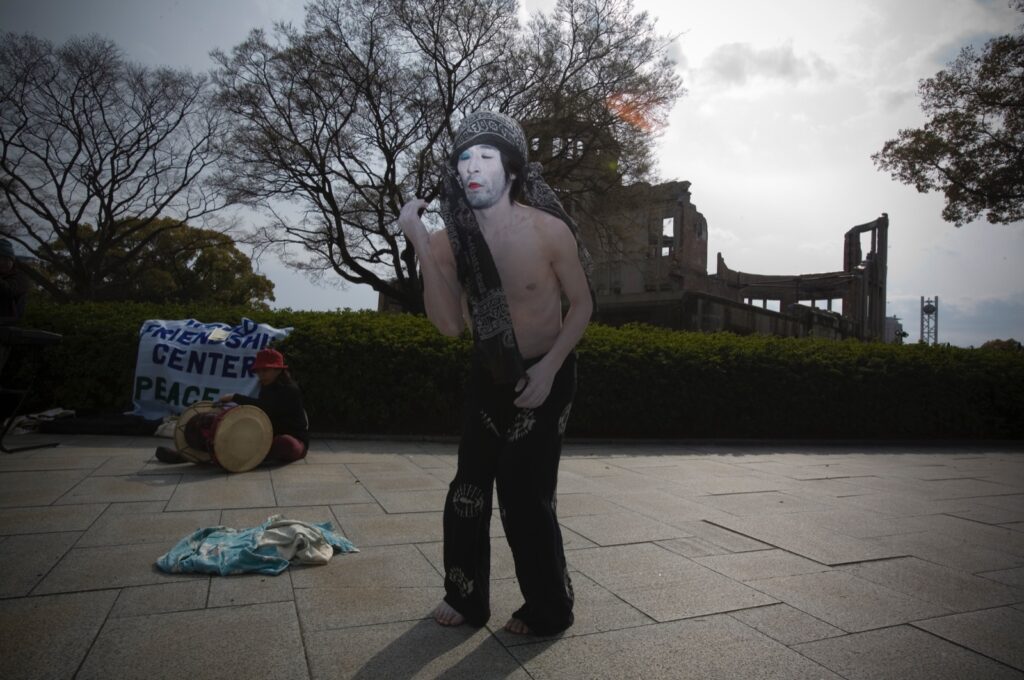
By Cristian Carlos, special for Peninsula 360 Press [P360P]
A total of 50 civilians were able to leave the Azovstal plant, the last bastion of resistance in Mariupol, on Wednesday evening. The figure was given by Ukrainian Deputy Prime Minister Irina Vereshchuk. UN Secretary-General Antonio Guterres said a third convoy was trying to rescue the remaining civilians after it was attacked by Russian troops.
It is the responsibility of all nations to ensure the safety of their citizens. Nuclear weapons are dangerous and the risk of their use must be constantly monitored. Only in this way can we ensure that citizens of all countries in the world can live free from the fear of nuclear annihilation.
For this reason, Ethnic Media Services offered a briefing to address tensions in Europe, Asia and the US over a possible escalation of nuclear weapons attacks.
Andriy Yermak confirmed that 500 civilians had already been evacuated from Mariupol days ago despite continued artillery attacks by Russian troops.
Daryl Kimball, executive director of the Arms Control Association and a contributing editor to the organization’s monthly magazine, Arms Control Today, said that in the post-Cold War era, Putin’s nuclear threats “are unprecedented.” However, they “are taken from the script of Russia’s ‘nuclear deterrence’ strategy” to prevent direct U.S. and NATO military intervention in Ukraine.

Kimball believes Biden disagreed with Putin on the use of nuclear weapons, but “there is a risk of escalation because of Russian and US military strategies that reserve the option of using nuclear weapons against non-nuclear threats” that could quickly become nuclear if Russian doctrine is followed: respond or threaten to respond when weapons of mass destruction are used or conventional warfare threatens state existence, while the US uses its arsenal as a deterrent while leaving open the possibility of its use.
Kimball therefore concludes that “in this situation of heightened nuclear risk, Russian and NATO leaders should maintain lines of communication to avoid direct conflict, refrain from actions that threaten nuclear escalation, increasing the risk of regional nuclear war.” Kimball believes it is important to resume diplomacy in the interest of disarmament to reduce the risks posed by an unbridled arms race.
Michael Klare, professor emeritus of peace and global security studies at Five College and director of the Peace and Global Security Studies Program at Hampshire College, said Taiwan has a similar case to Ukraine. He shared that China believes Taiwan is a province that has been neglected and maintained that there is a belief that “any Taiwanese person who wants to become independent from China is a direct revolutionary attack on the Chinese government that must be defeated by any means.”
Klare stressed that it is important to have a view of US interests: "I think the US attitude towards the current Taiwan conflict, which upholds the right to independence, is a cause for concern in China, as it is seen as a direct threat from the US that could lead to the development of tactical nuclear weapons.
"In Asia, we have a situation that is just as critical as the one in Ukraine," he concluded, and so "the US will not stop supporting Ukraine."

Gabriela Iveliz Rosa Hernandez, a research associate at the Arms Control Association, said that the events of February 24 gave rise to the primary objectives that Russia – led by Vladimir Putin – wants to establish in Ukraine, such as demilitarization of parts of the border; however, she pointed out that this type of conflict "can cause casualties" for both parties.
Rosa Hernandez said that the “simplest” explanation for understanding the current conflict is that “Russia is not happy with losing the influence that this country has” in Ukrainian territory. She concluded that “denazification” is, in reality, an attempt to make Ukraine “a less Russian country” after the agreements with NATO that could have, according to Rosa Hernandez, “American interests” that are still not clear.

Rosa Hernandez's perspective allows us to see that both nations are willing to put a ceasefire to the conflict, after Volodymyr Zelensky appeared during the month of March to find a way to end the Russian invasion by appealing to Ukraine's neutrality; however, he warned that there are other scenarios where the conflict could worsen due to the intervention of neighboring nations.
Regarding the use of nuclear weapons, Rosa Hernandez said that Russia's use of tactical nuclear weapons means "not being able to achieve the objectives of its military campaign." "Russia is not happy with losing to Ukraine," a strategy that, she says, "is not going to work."
Finally, he pointed out that although "the parties are resisting," there is still a long way to go to achieve a ceasefire, especially since Russia does not have a clear strategy. "At the moment, I do not see the conflict stopping in the short term," he said.
Andrew Nynka, editor-in-chief of The Ukrainian Weekly and Svoboda at the Ukrainian National Association, says the Ukrainian community says comments questioning U.S. involvement in Ukraine do not help the debate and should be more involved. He says people in Ukraine have a broader view on the use of nuclear weapons. He said nations should pay attention to letting Ukraine fight for itself autonomously and sovereignly.
You may be interested in: U.S. ANNOUNCES MEASURES TO PROTECT PEOPLE FROM UKRAINE. U.S. announces measures to protect people from Ukraine

